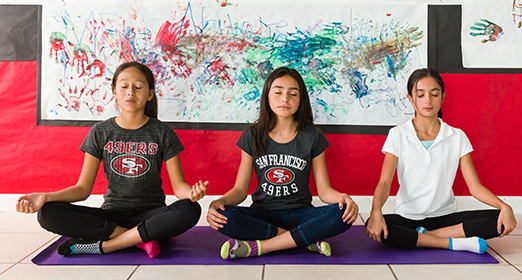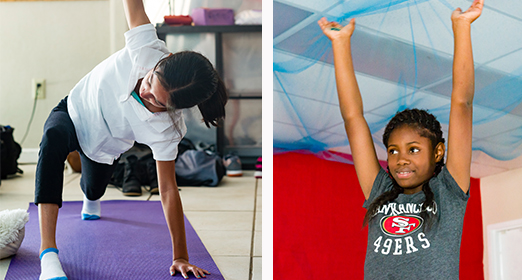A determined psychiatrist puts Stanford science to work for our community’s most vulnerable children.
Just down the road from Stanford University is East Palo Alto, a hard-scrabble community that struggles with crime and poverty. But nowadays it’s home to this uplifting sight: children lined up on yoga mats breathing, stretching, and meditating—and becoming healthier and more resilient.
It’s part of one determined Stanford psychiatrist’s personal mission to help all children reach their fullest potential. And it’s possible thanks to donors like you.
“I want to see every child have the same opportunities I did while growing up in Puerto Rico,” says Victor Carrion, MD, the John A. Turner Endowed Professor in Child and Adolescent Psychiatry at Stanford University School of Medicine. “To play freely in nature, to receive caregiving support, and to develop creativity when challenged.”
Carrion still remembers the first child who opened up to him about her trauma: a 5-year-old girl who had witnessed violence and abuse in her own home. He saw the tremendously negative mental and physical health effects that children suffered after experiencing a shocking, distressing, or emotionally painful incident or ongoing adversity.
Sadly, one in four children will experience a serious traumatic event before their 4th birthday, such as witnessing abuse or crime. When Carrion started his career in the 1990s, the existing treatments did not work for up to 50 percent of children and teens with post-traumatic stress disorder (PTSD).
So Carrion set out to create one that would.
A Breakthrough Discovery
In 2006, Carrion made a breakthrough discovery that forever changed how the scientific and medical community understands and treats PTSD in children and adolescents. Using functional MRI and saliva tests, he found that when children are repeatedly exposed to stress, their brains are bathed in the stress hormone cortisol. Over time, cortisol has a toxic effect on their brains, particularly in key regions that control emotion regulation, academic performance, and behavior. The ongoing psychological trauma was literally altering these children’s brains, putting their brains and other physical health at risk.
Armed with this new knowledge, Carrion developed an intervention called cue-centered therapy (CCT) that empowered children with PTSD to take charge of their own healing. Through this form of talk therapy, patients learn how stress affects their minds and bodies. They learn to recognize the things that trigger their post-traumatic reactions, read the signs that indicate a reaction has begun, and use healthy self-soothing techniques. The therapy helps to heal parts of the brain most affected by cortisol and helps patients rebuild the skills that have been impaired, including emotion regulation and memory.
Carrion’s first CCT patient was a 14-year-old former straight-A student who came to him displaying anger, panic attacks, and a D-grade average. These drastic changes began when the boy was attacked by his estranged father, on top of witnessing a lifetime of community violence. After treatment, the boy’s signs of PTSD almost entirely disappeared, and he flourished.
By 2013, CCT had been proven effective in a clinical trial and its results became widely disseminated. The technique is now being deployed across the Bay Area, in New York, in Carrion’s native Puerto Rico, and as far away as Spain, where it is being used in the country’s foster care system.
Carrion didn’t stop there.
“Treatment can change a child’s life,” he notes, “but prevention is equally important.” To help more vulnerable children and families before they need therapy, Carrion has also spent the past 15 years building trusted programs in local communities where violence, poverty, and other sources of trauma occur all too often.
At Ravenswood Family Health Center in East Palo Alto, primary care physicians are now trained to recognize and address mental health needs even though those are usually not the reasons patients initially come to the clinic. The psychiatry program there now serves more than 800 patients a year.
And today, through a major research project in partnership with the Sonima Foundation, K–8 students in the Ravenswood City School District—3,500 of them in all—are learning yoga and mindfulness as a way to cope with stress. With each breath and stretch, these children are gaining healthy coping skills and greater adaptability. Through brain scans, sleep analyses, and other data collection, Carrion’s team is scientifically validating the effectiveness of this intervention.
What’s more, Carrion participates in statewide efforts to address systemic influences on children’s mental health. He currently chairs the California Mental Health Services Oversight and Accountability Commission, and the group recently lobbied the California legislature to devote more resources to public mental health programs for youth. The legislature responded—to the tune of $30 million. While the need is still great, Carrion remains optimistic.
“I have seen firsthand how stigma, compromised health care access, and limited resources can limit individuals’ abilities to recover from trauma and succeed in life,” he says. “I have also witnessed the remarkable spirit of caregivers, parents, and other stakeholders in assuring a more prosperous future. Their courage and character should give us all hope for the future.”
“Treatment can change a child’s life, but prevention is equally important.” – Victor Carrion, MD
This article first appeared in the Fall 2016 issue of Lucile Packard Children's News.


